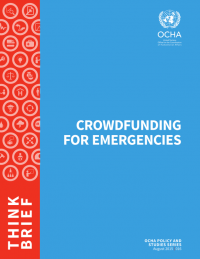 The United Nations Office for the Coordination of Humanitarian Affairs (OCHA) has released a briefing called Crowdfunding for Emergencies. Not really a how-to guide, more of a look at how it might work in the very best of circumstances. I’m glad to see a UN agency – OCHA, in particular – talking about crowdfunding – about how individuals can donate financially, directly, to humanitarian efforts – but any talk of crowdfunding needs to come with a reality check. And there’s no reality check in this short report.
The United Nations Office for the Coordination of Humanitarian Affairs (OCHA) has released a briefing called Crowdfunding for Emergencies. Not really a how-to guide, more of a look at how it might work in the very best of circumstances. I’m glad to see a UN agency – OCHA, in particular – talking about crowdfunding – about how individuals can donate financially, directly, to humanitarian efforts – but any talk of crowdfunding needs to come with a reality check. And there’s no reality check in this short report.
So, here’s my reality check regarding crowdfunding for humanitarian crises:
- Most of the time, a crowdfunding effort does NOT raise lots of money. Most crowdfunding efforts fail to meet the expectations of the initiatives that attempt them. We hear only about the campaigns that are wildly successful – not the many more that aren’t successful at all. Let’s look at just Kickstarter, which is mentioned repeatedly in the report — but without these statistics: less than 41% of approved Kickstarter campaigns get funded — and Kickstarter says another 20% of projects submitted are rejected by the site. Out of the over 72,000 projects funded on Kickstarter since its inception, as of October 2014, only about 1,600 raised more than $100,000.
- The wildly successful crowdfunding efforts you have heard about – for Haiti, for Nepal – have had a tremendous amount of marketing and media coverage behind them. Vast amounts. People were hearing about the dire circumstances in Nepal on the news, on the radio, on their social media networks, and on and on, for days and days. Most initiatives won’t have that kind of outreach behind their crowdfunding effort.
- The wildly successful crowdfunding efforts you have heard about have, later, lead to some very bad feelings among donors, who later read stories about the misuse of funds. Crowdfunding might get your initiative lots of money, but if it does, it will also get you lots of scrutiny. Are you ready to handle such? Are you ready to show the impact of the money you raised, in hard facts and figures, on demand?
- Donor fatigue is real. People get exhausted from seeing images depicting desperate circumstances. They are moved the first time, maybe the second time, but then they feel overwhelmed, emotionally-drained, even under siege. If your crowdfunding effort for a humanitarian crisis happens soon after another humanitarian crisis, it might not matter that you have an excellent outreach campaign and lots of media coverage.
I was glad to see this risk talked about in the publication:
“Financially supporting a few crowdfunded projects at the potential expense of the community-at-large is a substantial risk, as crowdfunding platforms tend to target individuals as compared to agencies.”
Crowdfunding is, absolutely, something humanitarian organizations should be exploring. But keep expectations realistic.
Also see:
